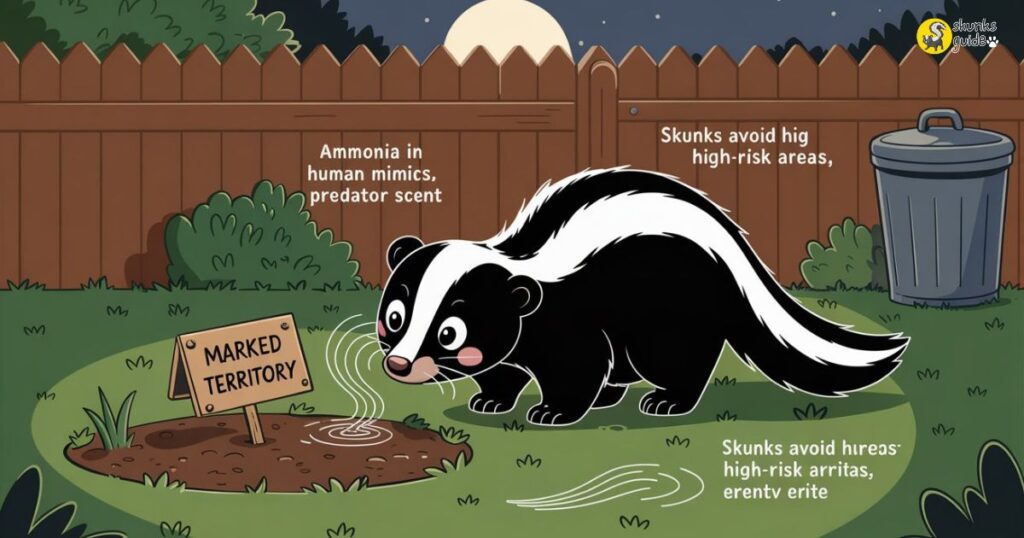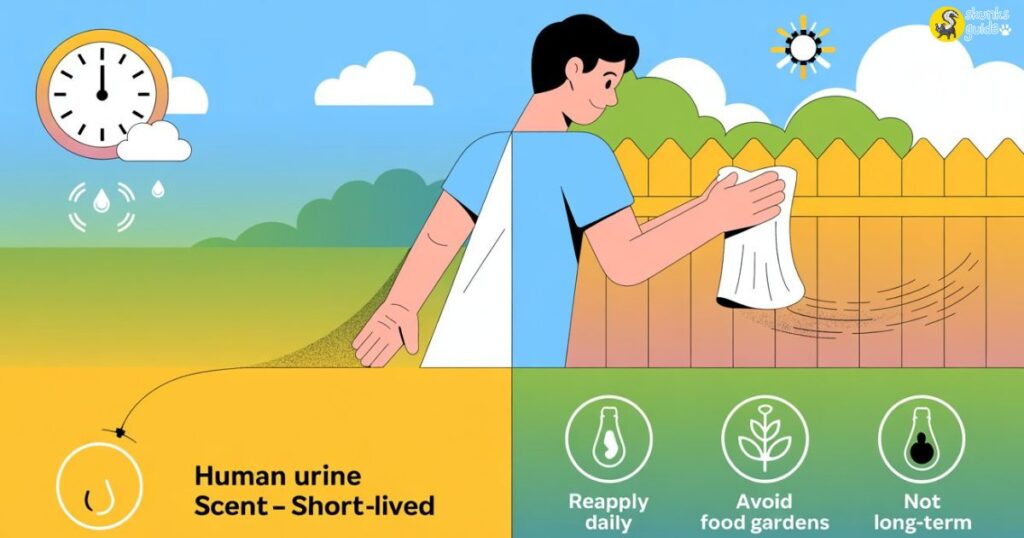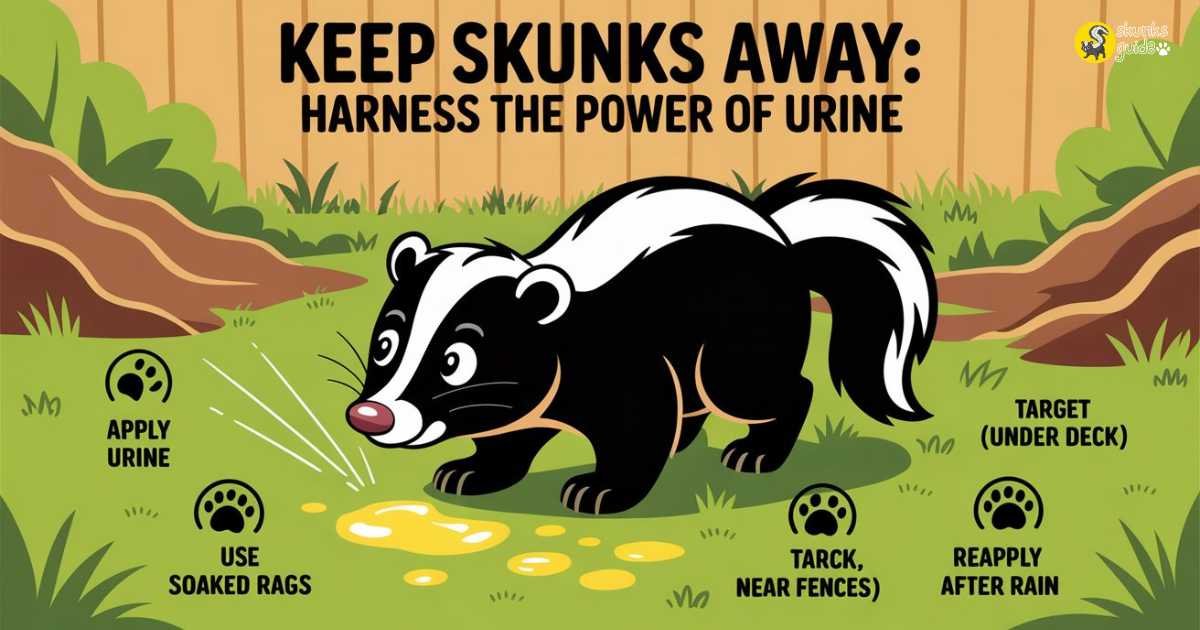Does Human Urine Repel Skunks? A Practical Guide for Homeowners and Gardeners
Skunks digging up your yard? Trash cans flipped over? That stubborn smell refusing to leave? You’re not the only one dealing with nighttime visits from these striped stinkers.
You might’ve heard a strange tip: human urine can repel skunks. Sounds weird—but it’s not completely wrong.
As a wildlife researcher who’s spent years studying animal behavior (including skunks), I can confirm: skunks are naturally timid, and the smell of human urine may make them believe a predator is nearby. That’s often enough to keep them away—but only for a short time.
Let’s look at why this works, how to do it right, and what else you should be doing to keep skunks off your property for good.
What the Science (and Anecdotes) Say

So, does human urine repel skunks? The short answer: maybe—but don’t count on it as your only line of defense.
Human urine contains ammonia, which has a strong smell. In theory, this odor can act as a territorial signal to some animals, causing them to avoid areas where they think a larger predator has marked territory. Some gardeners and homeowners swear by it as a deterrent for deer, rabbits, and even skunks.
However, there’s no conclusive scientific evidence proving human urine is an effective long-term skunk repellent. Skunks are adaptable, especially if they find food or shelter nearby. That weird corner of your garden you “marked” last night might still look like a five-star skunk hotel in the morning.
Why Skunks Stay Away From Human Urine
Skunks rely heavily on their sense of smell to avoid danger and find food. They associate the scent of urine—especially from predators like foxes, coyotes, and yes, humans—with risk. When they catch the scent of human urine, their natural response is to move on to a safer area.
It’s not that urine is toxic or harmful to them—it’s more about territorial signals. Just like cats and dogs mark their turf, urine is nature’s “no trespassing” sign. For skunks, that’s often enough to back off.
But here’s the issue: the smell fades quickly. Rain, heat, and even just time will reduce the potency. That’s why urine is a weak, short-term deterrent at best. For it to work, it must be reapplied often—and that can be, well, awkward.
How Long Does Human Urine Repel Skunks?

Even if human urine does have a repelling effect, it’s short-lived. The scent dissipates quickly—especially with rain, sun, or irrigation systems. At best, you might get a day or two of minor deterrence before needing to reapply (yeah, we know—yikes).
And remember: frequent urination around your yard is not just awkward—it’s also unhygienic and not the most neighbor-friendly approach.
How Should You Use Human Urine to Repel Skunks?
If you’re curious (or desperate) enough to give this method a try, here’s how to use it more effectively and hygienically:
- Use it where skunks enter: Apply near burrows, fences, or known travel paths.
- Try soaking a rag: Instead of urinating directly on your yard, soak cotton balls or rags in urine and place them strategically.
- Apply at night: Skunks are nocturnal, so fresh scent at night is most effective.
- Reapply often: Daily, or after rain or watering.
What to Avoid:
- Don’t rely on urine alone.
- Don’t apply it near food gardens or kid play areas—hygiene matters.
- Don’t expect long-term results.
And yes, it might feel weird—but compared to skunk spray on your dog or under your deck, it’s not the worst option!
What Other Things Should You Do To Repel Skunks?
Human urine alone won’t keep skunks away forever. Here’s what you should also be doing:
- Clean up food sources: Skunks love trash, pet food, birdseed, and fruit. Secure all food and garbage.
- Seal hiding spots: Block off gaps under decks, porches, and sheds with wood or wire mesh.
- Add light: Skunks prefer the dark. Motion-activated lights or solar garden lights can make your yard less inviting.
- Rotate natural scents: Try citrus peels, ammonia-soaked rags, or even predator urine (like fox or coyote) for stronger scent deterrents.
- Use noise or water deterrents: Motion-activated sprinklers or ultrasonic devices can scare them off without harm.
Tips for Keeping Skunks Away Naturally
- Eliminate food sources: Secure trash cans, remove pet food at night, and clean up fallen fruit.
- Seal entry points: Skunks love to nest under decks and sheds. Use mesh or wood to block access.
- Light it up: Skunks are shy and nocturnal. Motion sensor lights make your yard less appealing.
- Use sound: Some people use ultrasonic repellent devices to deter a range of pests, including skunks.
What Really Works? A Personal Note
As someone who’s spent years advising on backyard wildlife, I’ve tested everything from ammonia sprays to classical music (don’t ask). The truth? No single method works forever, especially if skunks find something rewarding in your yard. A layered approach—barriers, scent deterrents, and habitat changes—works best.
And if you’re really tempted to try the whole human urine method… well, don’t say we didn’t warn you about the odd looks from your neighbors.
Final Thoughts from James Don
Human urine can repel skunks—for a little while. But it’s a short-term tactic, not a long-term fix. As someone who’s worked closely with both wild and nuisance animals, I’ve seen that a smart, multi-layered approach works best: remove attractants, close off shelter, and rotate natural deterrents.
Skunks don’t want a fight—they just want food and shelter. Once they realize your yard is more trouble than it’s worth, they’ll move on.
So if you’re dealing with a skunk problem, don’t just “go” out there and hope for the best—plan it out smartly, and your yard will be skunk-free before you know it.







